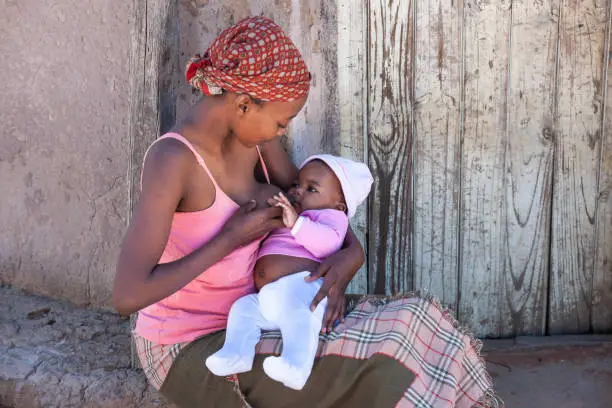
The weeks after childbirth are often filled with both joy and vulnerability—a time of recovery, bonding, and adjustment for the new mother. While modern medicine offers physical care, many cultures across Africa and beyond have long recognized that healing goes deeper than that. Rooted in centuries of wisdom, postnatal traditions have evolved to nurture the mother’s body, spirit, and place within her community.
From seclusion rituals that protect and restore, to dietary customs designed to rebuild strength, these traditions reflect an understanding that postpartum care is not only personal, but deeply cultural. Here are top 5 African postpartum practices that continue to honor mothers in meaningful ways.
1. Seclusion or Confinement Period
Examples: Kumlehedzya Umwana (Zambia), Kulawa Kunzi (Mali), Omugwo (Nigeria)
Seclusion is one of the most widespread postpartum traditions in Africa. In Zambia, the Tumbuka people practice Kumlehedzya Umwana, where the mother and baby are kept indoors for several weeks to protect them from spirits and illness.
In Mali, Kulawa Kunzi refers to a 40-day rest period for the mother, during which she is cared for by older women. Similarly, among the Igbo of Nigeria, Omugwo involves a mother or mother-in-law moving in to help with baby care and housework, while also passing down traditional practices. These customs prioritize maternal healing, infant safety, and intergenerational bonding.
2. Traditional Baths and Massage
Examples: Ubuyanja (Rwanda), Kugumira (Uganda), Fufuto (Ghana)
In many African cultures, postpartum care includes specialized baths and massages to aid recovery. In Rwanda, Ubuyanja involves steaming and herbal baths believed to cleanse the womb and prevent infection. In Uganda, Kugumira consists of abdominal massages with herbal oils to help the uterus contract and restore the mother’s figure. The Akan people of Ghana practice Fufuto, where warm water mixed with herbs is used to bathe the mother daily. These therapies serve both physical and spiritual purposes, anchoring the mother’s recovery in ancestral wisdom.
3. Dietary Customs for Recovery and Lactation
Examples: Nkoko (Cameroon), Kito (Ethiopia), Isitshwala Samasi (Zimbabwe)
African postpartum diets are often rich in meaning and tailored for rejuvenation. Among the Bakweri in Cameroon, Nkoko—a spicy chicken soup—is served to promote milk production. In Ethiopia, women are given Kito, a high-fat porridge with butter and spices, thought to aid healing and strengthen the body. The Shona of Zimbabwe provide new mothers with Isitshwala Samasi, a soft maize meal dish accompanied by nutrient-rich vegetables. Food becomes not just nourishment, but a restorative medicine woven into tradition.
4. Infant Naming Ceremonies
Examples: Outdooring (Ghana), Imbeleko (South Africa), Suna (Somalia)
Names in Africa often carry deep meanings, tied to circumstances of birth, ancestry, or blessings. In Ghana, the Outdooring ceremony occurs eight days after birth, introducing the baby to the sun and community. In South Africa, the Zulu practice Imbeleko, where a goat is slaughtered and the child is officially welcomed into the lineage. Among the Somali, Suna (naming and circumcision) takes place within the first week. These rituals reflect a child’s spiritual and social entry into the world, often involving prayers, songs, and symbolic gestures.
5. Protective and Spiritual Rituals
Examples: Kuthwasa kwa mwana (Malawi), Ukuthwasa (South Africa), Khalo la Ngaka (Botswana)
Postpartum traditions also involve rituals to ward off evil and bless the child. In Malawi, Kuthwasa kwa mwana involves tying protective charms or beads around the baby’s waist. Among traditional Zulu healers, Ukuthwasa refers to cleansing rituals that include both mother and child, protecting them from misfortune. In Botswana, Khalo la Ngaka involves herbal smudging and blessings by a traditional healer to ensure spiritual safety. These practices affirm a sacred worldview where childbirth is watched over by both ancestors and community.
Rooted in collective care, spirituality, and wisdom, African postpartum traditions ensure that mothers recover fully and that newborns begin life surrounded by love, rituals, and meaning. In an age of clinical births and fast-paced lifestyles, these age-old practices offer timeless insights into what it means to welcome life into the world.
